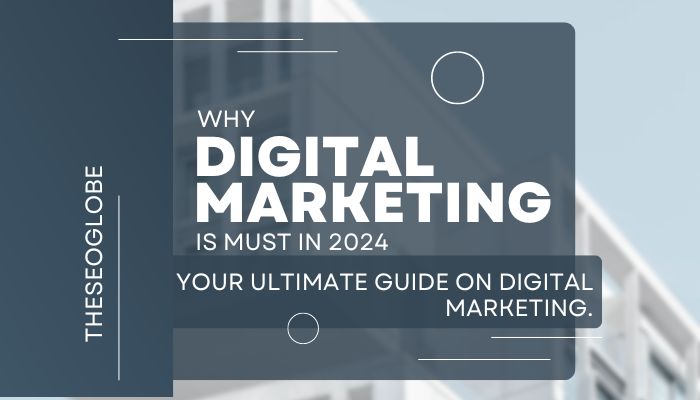Here is The Ultimate Guide on Digital Marketing. Learn Basics and Know How to Get Started as a Beginner.

There’s a common misconception in the digital world, that it’s a walk in the park. Some might simplify it as just hitting marketing targets using digital tools in seconds. But in reality? It’s far from a cakewalk! Digital marketing is more akin to navigating a bustling cityscape full of twists, turns, and unexpected detours.
In today’s world, where digital and mobile reign supreme, it’s not enough to simply be present online. Businesses must craft a strategic roadmap, and a digital marketing plan to thrive in this ever-evolving terrain.
There are many businesses that are lost in this vast digital sea, lacking a clear plan to steer their ship towards success. Moreover, the startling truth is without a well-thought-out strategy, businesses struggle to engage their audience effectively and, in turn, miss out on opportunities for growth and transformation.
But fear not! In this article, we’ll embark on a journey through the bustling streets of digital marketing. We’ll uncover why having a solid digital marketing strategy is an absolute must for businesses of all shapes and sizes. From startups to corporate giants, the absence of a strategic plan can lead to a host of challenges, leaving them stranded in the wake of their digitally savvy competitors.
So, buckle up and get ready to explore the vibrant world of digital marketing. Together, we’ll unravel the complexities, tackle the challenges, and unearth the countless opportunities that await those bold enough to embrace the digital frontier. Additionally, it’s time to chart a course towards success in the digital age—and we’re here to guide you every step of the way.
A Strategic Approach to Understanding Digital Marketing
The modern business need for digital marketing has emerged as a cornerstone for success. Yet, despite its apparent simplicity, mastering the art of digital marketing requires a strategic mindset and a comprehensive understanding of its nuances.
At its core, digital marketing can be defined as the utilization of digital media, data, and technology to achieve marketing objectives. Crafting effective digital marketing strategies is more complex than it seems. While digital channels offer undeniable opportunities for customer acquisition and retention, many businesses struggle to fully leverage their potential.
A significant number of businesses lack an integrated plan to support digital transformation and foster effective audience engagement online. Additionally, Here the competition is fierce and consumer expectations are constantly evolving, businesses must recognize the critical importance of a strategic digital marketing approach aligned with overarching business goals.
Let us learn the essential reasons why a strategic digital marketing plan is indispensable for businesses of all shapes and sizes. From startups to established enterprises, the absence of a cohesive digital marketing strategy can lead to a myriad of challenges. Also, ultimately hindering growth and competitiveness in the arena.
Throughout our exploration, we will highlight the key reasons why businesses need to see digital marketing as a strategic must, not just a tactical option. Each of these reasons presents both challenges and opportunities, offering valuable insights into how businesses can enhance their planning processes to drive sustainable growth and success.
Whether you’re new to digital marketing or a seasoned pro looking to fine-tune your strategy, this Guide has something for you. We’ll provide you with the insights and tactics necessary to navigate the digital landscape with confidence and foresight.
The Six Pillars of Digital Marketing
In smaller businesses, a single individual like a digital marketing manager may oversee all pillars, while larger businesses may have dedicated teams for each pillar.
Here are the six Pillars:
Strategy and Governance: This pillar encompasses setting goals, analyzing data, devising strategies (such as segmentation, targeting, and brand positioning), ensuring integration across marketing channels, aligning marketing with sales, and managing resources and structures.
Goals and Measurement: Focusing on setting forecasts, digital reporting (including KPI dashboards), understanding attribution, and gaining insights into customer behaviour to measure the effectiveness of marketing efforts. Moreover, setting realistic goals is important.
Media: This pillar deals with managing paid, owned, and earned media channels, including Search, Social, and Display advertising, to reach and engage target audiences.
Experience: Ensuring a seamless and positive experience for customers across desktop and mobile websites. Moreover, the apps provide excellent customer service to enhance satisfaction and loyalty.
Messaging: Managing communication channels such as email, chat, social media, and on-site interactions. And implementing personalization strategies to deliver tailored messages to customers.
Content: Creating and distributing compelling product and blog content. Supporting the content marketing efforts, offering downloadable resources like PDFs, and developing interactive tools to engage and educate audiences.
Reasons Why You Need a Digital Marketing Strategy
It’s crucial to justify increased investment in digital marketing because if you can’t persuade yourself or your colleagues to invest, the future of your business could be at risk. Put simply, without the ability to compete for new customers in the future, your business could struggle. Here are ten reasons why you need a strategy:
-
Lack of Direction
Without a digital strategy, many companies lack a clear goal for their online efforts, which can hinder their ability to attract new customers or build stronger relationships with existing ones.
-
Poor Digital Maturity
Businesses often allocate insufficient resources to digital marketing. Leading to a lack of specific skills and a limited ability to respond to competitive threats effectively.
-
Losing Market Share
If you’re not investing enough in digital marketing or using a haphazard approach, your competitors may gain an advantage through more focused and consistent online marketing efforts.
-
Inadequate Understanding of the Audience
Without research, you may underestimate customer demand for online services. Also, one can fail to grasp the dynamics of your online marketplace.
-
Weak Online Value Proposition
A clearly defined digital value proposition tailored to different customer personas can help differentiate your brand and encourage customer engagement and loyalty.
-
Limited Customer Insights
Digital marketing offers extensive measurement capabilities. Relying solely on analytics may not provide a complete understanding of customer sentiment and preferences.
-
Lack of Integration
Isolated activities can lead to inefficiencies and missed opportunities, emphasizing the need for an integrated marketing strategy.
-
Duplication of Efforts
In larger companies, redundant tools or agencies may lead to wasted resources and decreased effectiveness.
-
Inability to Adapt
Successful online brands are dynamic and continuously experiment with new approaches to engage and retain their audience.
-
Failure to Optimize
Neglecting to review and act on analytics can prevent continuous improvement in key areas such as brand building and user experience.
Digital Marketing in Practice: Where to Start
The starting point can be tricky, the digital marketing journey requires a solid foundation to navigate the vast and ever-evolving landscape effectively. Here are the pointers to kickstart your efforts:
- Define clear goals to guide your digital marketing strategy from the outset.
- Understand your audience’s demographics, interests, and online behaviour.
- Optimize your website for user-friendliness, mobile responsiveness, and search engines.
- Create valuable and relevant content to engage your audience across channels.
- Choose the right digital channels based on where your audience is most active.
- Plan and schedule your content distribution using a calendar for consistency.
- Implement SEO strategies to improve your website’s visibility in search results.
- Engage with your audience on social media to build relationships and brand awareness.
- Measure key metrics to track the performance of your campaigns.
- Continuously analyze data and refine your strategies to stay ahead of the curve.
Taking Help of Artificial Intelligence and Machine Learning in Digital Marketing
Leveraging Artificial Intelligence (AI) and Machine Learning (ML) in digital marketing is reshaping strategies and outcomes. AI algorithms analyze vast amounts of data, enabling personalized customer experiences, predictive analytics, and targeted advertising. Also, ML algorithms continuously learn from data patterns, refining audience segmentation and optimizing marketing campaigns for maximum impact. From chatbots offering instant customer support to recommendation engines driving sales, AI and ML are invaluable tools for enhancing efficiency and effectiveness.
Personalization: Tailoring Efforts for Maximum Impact
Personalization maximizes impact by tailoring strategies to individual preferences and behaviours. By leveraging data analytics and AI-driven insights, businesses can deliver targeted content, offers, and recommendations to engage customers on a personal level. Moreover, from personalized email campaigns to dynamic website experiences, customization fosters stronger connections, boosts conversion rates, and enhances overall customer satisfaction. In today’s competitive landscape, personalization is not just a strategy but a necessity for driving meaningful interactions and achieving marketing success.
Measuring Success: Key Metrics and Analytics
Success isn’t just a concept—it’s quantifiable!
From click-through rates to conversion rates, every interaction leaves a digital footprint waiting to be analyzed. Key metrics and analytics serve as our compass, guiding us through the vast digital landscape. They unveil the effectiveness of our campaigns, revealing insights into customer behaviour and preferences. Moreover, armed with this knowledge, they refine the strategies, optimize our efforts, and embark on a journey toward unparalleled success in the ever-evolving digital realm.
Also Read:

